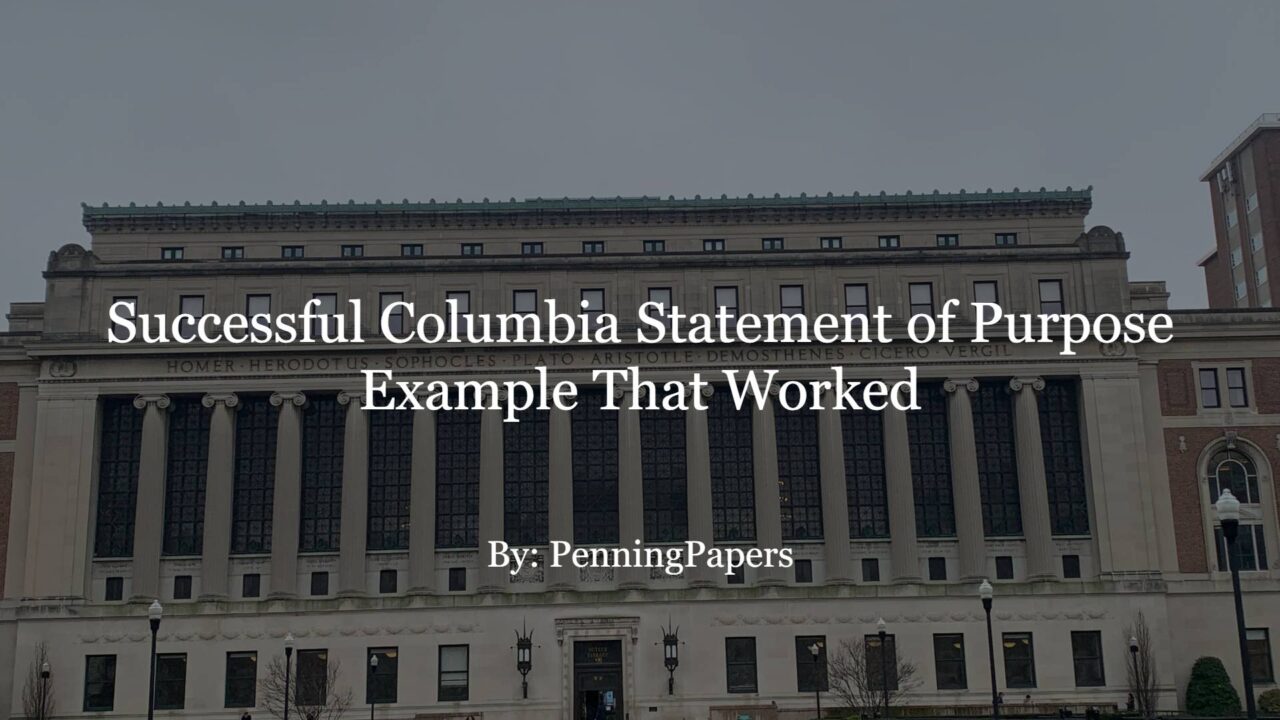Note: this article covers our Successful Columbia Statement of Purpose example that worked. (not to be confused with the Columbia Personal Statement example.) If you’re looking for our Columbia Personal Statement example that worked, check out our sister article here.
In this article, we’ll be covering an example Columbia University Masters Statement of Purpose that worked.
We’ll also be discussing out applicant’s stats, background, the essay itself, and what made it successful.
Table of Contents
- Columbia Masters Statement of Purpose Prompt.
- Columbia Masters Applicant Stats & Background.
- Successful Columbia Statement of Purpose Example.
- What Made This Statement of Purpose Successful?
- Frequently Asked Questions.
Professional College Application Help.
Contact us. We'll get to you within 24 hours.
Columbia Masters Statement of Purpose Prompt.
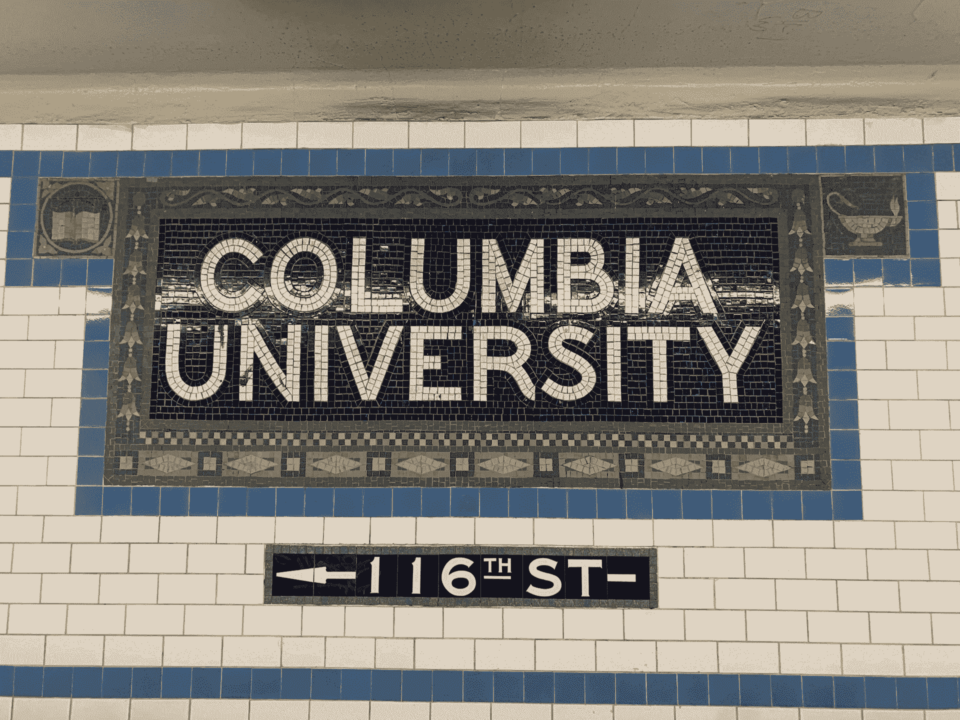
“Prompt: All applicants must submit a statement of academic purpose. Please compose a succinct statement of approximately 1,000 words describing your past academic work and preparation related to your intended field of study, your plans for graduate study at Columbia, and your subsequent career objective. If you intend to transfer from a graduate program at another university, please explain why you wish to do so. If you are not currently pursuing an academic program, please describe your activities since you last enrolled in an academic institution. If there has been a break in your educational experience, please include a brief explanation.”
Columbia Masters Statement of Purpose Prompt
Columbia Masters Applicant Stats & Background.
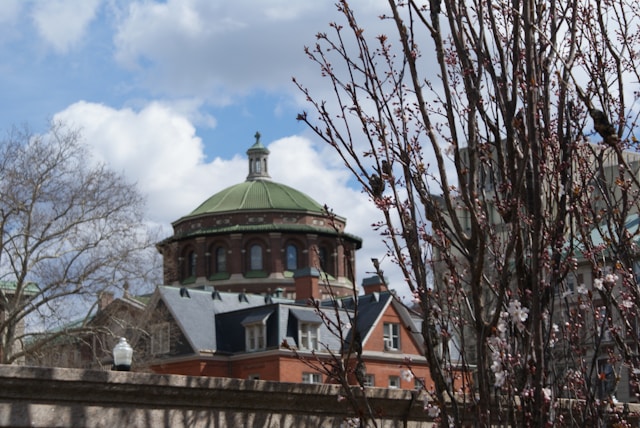
Here’s some info on our applicant who was accepted into Columbia’s Masters program.
- GPA: 3.7
- Program: Art History
- Research: * N/A
- Work Experience: * Extensive
- Extracurriculars: * 2
*indicates the applicant chose to withhold details for privacy reasons.
It should be noted that this profile is only one accepted student. They are not conducive of all students accepted into Columbia’s Masters program. So, just because you have a similar profile does NOT guarantee you’ll be accepted into Columbia’s Masters program.
There is always a randomness factor to college admissions, whether you have strong stats, essays, or both. That’s why it’s absolutely crucial to cast a very wide net when applying for schools.
If you’re unsure what program your stats and background qualifies you for, consider speaking with us for a free consultation. We’ll respond within 24 hours, and craft a solid list of programs best suited to your stats!
Successful Columbia Statement of Purpose Example.
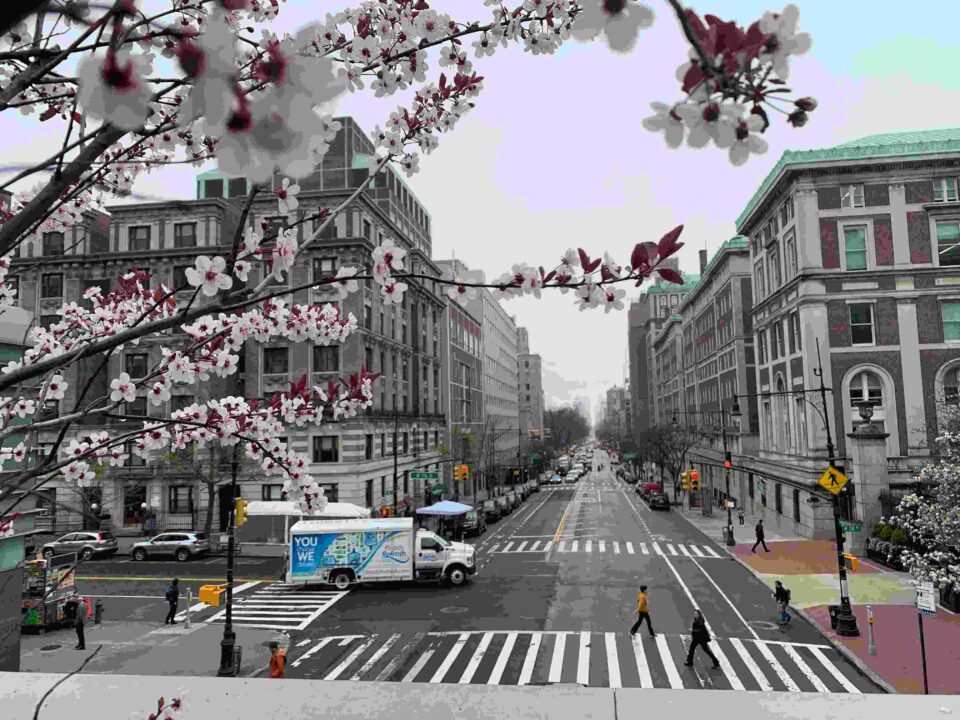
“18th-century euroiserie in Asia —a seldom-charted field— is a fascinating path I’m interested in researching, which is why I am applying to the MA in Art History program at Columbia University. To do so, completing a graduate-level degree is imperative. So, I aim to pursue the highest caliber of education possible to conduct in-depth research and maximize the opportunities available, with the ambition of turning my research into my career. With these exciting —albeit ambitious— goals, I embrace unfamiliarity as I strive to obtain my master’s degree. Nonetheless, I prepared for this research by earning a bachelor’s degree in both Art History and International Relations at the University of California, Davis; this helped me master and synthesize the interdisciplinary elements of both fields.
To specify, the field I seek to research in art history is dismally under-researched: the Western/European influence on Chinese art, material culture, and architecture in the 1700s. A quick internet search for “European art in East Asia,” begets articles on the opposite. Yet, after a bit of digging through academic texts at the library, evidence of European artists and aesthetics in Qing Dynasty China suggests a market for European goods and art. These include silks, clocks, tapestries, astrological devices, and the artistic skills of European Jesuit missionaries, to name just a few things. If chinoiserie can provide valued insight into how Europeans valued Asian aesthetics, then surely we may infer the inverse is true for euroiserie.
For me, studying the material culture of euroiserie satisfies a lifelong fascination with the aesthetics of “stuff” and cross-cultural exchanges in art. Extended research in this field helps to reshape preconceived presuppositions of European cultural exchange in pre-colonial China, hence my fascination. In researching this topic, I hope to change the default assumptions that Europeans were the sole collectors of foreign art and goods. In reality, these goods were not imported for free, and European-made products were just as exotic to the nobles of East Asia.
Euroiserie research has large gaps I wish to fill; any investigation will require intensive interdisciplinary research from the ground up, possibly quite literally. Its multidisciplinary nature requires knowledge of political, economic, social, and cross-cultural exchanges on the movement and acceptance of certain aesthetics and pieces. Fortunately, I have experience with this. In a seminar on 17th-18th Century Material Culture in Europe, I wrote my thesis on women and handheld fans in Europe during the 18th century, using a mask fan housed in Boston as an example. There was little to no information on the object I had selected; so, I spent hours poring through UC Davis’s extensive library resources to understand hand fans, masks, women’s role in society, details explaining my fan’s role for its owner, international themes on the fan, and why someone might come to possess such a thing. This paper is a testament to my analytical research capabilities and talent for presenting extensive data to my professor and peers, having received full credit for it.
On a broader level, my degree in International Relations emphasizes the importance of multidisciplinary research to come to a single conclusion. Understanding how historical affairs between countries influenced modern economics, political relationships, and events is critical. Furthermore, I studied both Mandarin Chinese and Italian while working towards this degree, a critical foundational skill to approach relevant source materials on European and Asian ends of euroiserie. My specialization in East Asian global affairs established connections between these fields and pushed me to study abroad in Hong Kong. There, I studied how economic trade, political relationships, and religious interests culminated in an exchange of art forms that shaped East Asian architecture and was first introduced to the concepts of European aesthetic influence in China. The Western Mansions of the Old Summer Palace of the early Qing Dynasty were only briefly covered but unlocked a curiosity for a field I had not previously considered. Simply by knowing they existed, my artistic worldview shifted further from a Eurocentric one to a broader image of global exchange through the arts. It seems critical that I pursue this path in academia as a career, as art history yearns for new understandings and decolonized approaches are encouraged. My access to multiple perspectives between my diverse studies and time abroad has allowed me to consider forms of art uniquely.
Columbia University’s strong research resources and background would be perfect for supporting my endeavors with its hands-on approach to art history. Furthermore, Professor Higonnet and Professor Xu are both deeply knowledgeable about different aspects of the topics I am interested in: 18th-century (and forward) material studies and Chinese art and architecture respectively. Their capabilities and support would be invaluable to my development as an art historian. While they are the most relevant professors, Columbia has a large network of faculty who specialize in topics close to my passions. This wide pool of specialists in my field would provide me with a holistic perspective that can aid my studies. And, it would enable me to spearhead an exciting career in research and academia; thus, I hope Columbia University will consider me as a worthy candidate for their Art History MA program.”
Example Columbia University Masters Statement of Purpose That Worked –PenningPapers
What Made This Statement of Purpose Successful?

A Narrow Niche.
It’s important for aspiring masters students to know what they want to pursue in their higher education. But, perhaps more important than that is to focus on a narrow academic niche.
An academic niche means any element of your chosen industry that has the potential for further research and focus, often involving hyper-specific attention to details others may consider obscure in your field.
You can think of these as “specializations” or subsets of a broad topic.
For instance, some students studying psychology may have an interest in studying group B personality disorders such as NPD. Additionally, they may be interested in how cultural nuances such as those in Chinese or Korean culture may impact the effects of NPD households.
These are hyper-specialized niches that aren’t just covering a broad topic. And, chances are, if you’re interested in covering anything worth its salt, you’re doing research on topics that have potential but also aren’t dived into enough depth yet.
This helps establish you as a potential authority in a new branch of your industry; and, if the admissions office has faith in your research, they’ll be happy to invest in taking you as a student.
Intentionality.
This is a subtle point, but a good one.
Most students have a vagueness to their essays because they don’t really quit know what they want out of a Masters education. They’re applying to Columbia perhaps for the prestige and glory that comes with the name. Or, they just want a place to call home before they start “adulting” in their chosen industry.
This is very common. But, it’s important for the admissions office to know that you’re not just calling Columbia home for the sake of having a space. You should pursue Columbia for valid and important reasons.
Some of these reasons can be self serving, such as wanting to push yourself academically or explore a passion in your field, sure. But, it’s your intentionality and desire to pursue your field that truly ensures admissions officers can place their faith in you. They’ll know they’re investing their time, resources, and efforts into someone who has an actualized realistic, interesting, and compelling plan.
Our applicant’s example Columbia University MA Statement of Purpose fulfills this intentionality perfectly. It’s clear here what they want to do and how they’ll leverage a Masters education at Columbia to achieve that.
So, don’t keep your goals vague and foggy. Students write vaguely only because they’re still unsure what to do with a Masters education. Be straightforward and clear to demonstrate your determination, certainty, and intentionality!
Honesty and Transparency.
It’s absolutely crucial that you demonstrate honesty and transparency in not just the Columbia statement of purpose but all parts of the application.
In our modern college admissions climate, it’s common for students to do everything they can to wiggle their way into prestigious universities. Unfortunately, this comes with a lot of dishonesty, white lies, and stretching of the truth.
Students will do everything they can to game the system to their advantage. And, it’s due to this sly behavior that admissions officers across the board value honesty and transparency so much.
Your goal, not just in the Columbia MA Statement of Purpose but all MA essays, is to establish trust with your admissions officers. When they read your SOP, they should feel comfortable enough to take you for your word.
It sounds simple and easy, right?
Well, not really.
It’s all too common for students to write their Columbia Statement of Purpose in a manner that obviously overstates their achievements and work. They’re writing to impress them; and, it shows through their wording. In reality, you should be writing to be as accurate, articulate, and positive as possible. By writing accurately and being articulate rather than ostentatious with your leadership or research experience, you’ll garner their trust much more!
Sure, you can show off a bit. But, don’t delude yourself into thinking you can bend and twist your activities to “trick” admissions officers into accepting you. They’re smarter than you think; and, they likely saw any linguistic trap you’ve creatively conjured already!
When you are honest, transparent, and open in your Statement of Purpose, you gain the admissions office’s trust. And, their trust is certainly worth al lot.
Value to the Columbia Community.
This isn’t easy to do. But, it’s still an important point. When writing the Columbia Masters SOP, you need to prove how you’ll be of value to the Columbia community.
Now, this doesn’t mean you have to be very direct and literal in your SOP. You’re not required to say precisely “I will add value to the Columbia community and family because….”
Instead, you can be subtle. You can weave in values throughout the Columbia SOP to show admissions officers how you’ll be valuable to the university altogether.
Let’s take a look at our Columbia Statement of Purpose example again. It discusses the value of pursuing material culture of euroiserie. This is a very small niche in the world of Art History; and, there are not many easy paths to getting everything one would need to truly pursue this niche as an academic. So, attending Columbia (especially their extensive library network with all other Ivy League schools) is particularly useful here. More importantly, it’s implied in the essay that Columbia would benefit from having someone such as them pursuing this untouched path.
Thus, one of the best ways to show Columbia your value is to demonstrate how your niche topic of interest would further Columbia’s interests and academic reach.
Genuine Passion.
One of the best things you can do in any Statement of Purpose is demonstrate genuine passion for the field you’re getting into.
It’s common for students to make their work experience, achievements, and leadership titles the forefront of their writing. And, while it’s good to mention these, it’s common for all students to have these. In fact, many students pursue work experience and leadership positions for the sole reason of getting a higher chance of acceptance into prestigious schools.
But, what these students don’t consider is the value of demonstrated genuine passion.
Here’s a cliche: “Choose a job you love, and you will never have to work a day in your life.” Sounds generic, right? Well, yeah. But, there’s a bit of a truth in this. It’s far too common for students pursuing prestige and notoriety to burn out of academia because they don’t truly have a passion and drive for what they’re pursuing. Those with a passion for the brownie points rather than the field they’re pursuing itself won’t last long. It’s the students who truly have a love for their craft who stay and continue to do great things —who are exactly the type of student Columbia wants.
Thus, it’s crucial to demonstrate in your Statement of Purpose —not directly, but subtly between the lines— your passion and love for the field.
Take a look at this section of example accepted SOP for instance.
“There was little to no information on the object I had selected; so, I spent hours poring through UC Davis’s extensive library resources to understand hand fans, masks, women’s role in society, details explaining my fan’s role for its owner, international themes on the fan, and why someone might come to possess such a thing.”
Excerpt from accepted Columbia Masters Statement of Purpose
The applicant discusses how they could not gain enough information on hand fans; so, they conducted deep research through UCD’s library resources to explain this one detail.
While this may have been overkill on one detail; it’s still a subtle way of showing how the applicant goes above and beyond for their craft. They’re willing to explore a topic and cross reference multiple resources to come to solid conclusions not just for a grade, but to explore their love for the field. It’s clear from this applicant’s background that they’re someone capable of digging deep into topics unexplored and considered obscure in their field.
Frequently Asked Questions.
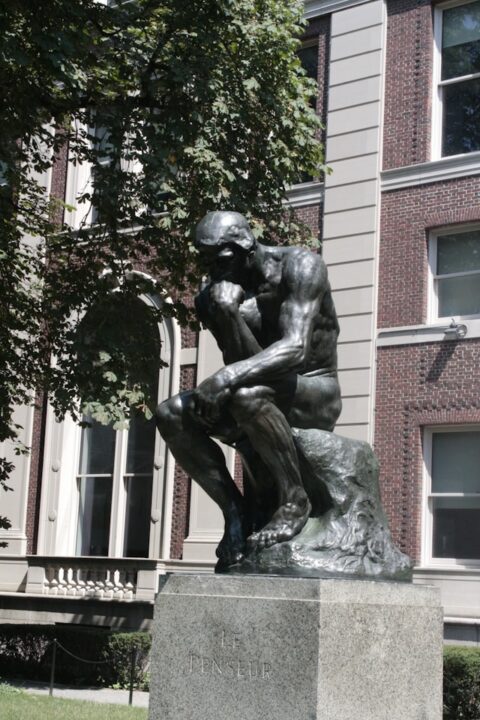
- What’s the difference between Columbia’s Statement of Purpose and Personal Statement?
- The Columbia Statement of Purpose is academics based and more focused on future research you are interested in tackling. Meanwhile, the Columbia Personal Statement is more personal and covers topics regarding character traits and personal experiences. Source.
- How long should the Columbia Statement of Purpose be?
- You want to keep it at approximately 1,000 words. While covering more is technically fine, you want to ensure your words are concise and not going way overboard. Additionally, don’t be short to the point of being topically thin.
- What is the average Columbia graduate school acceptance rate?
- While different programs vary, the masters programs at Columbia typically range from 5% -15%.
- What if I don’t have any topics or goals to write about in my Columbia Statement of Purpose?
- This is a common problem for a lot of students writing their Personal Statements or Statement of Purposes for masters programs. It’s often a result of students being unsure of what they really want out of higher education. Ultimately, you can’t know what to write about in the SOP without knowing what you want in life altogether. You need to have personal desires actualized in your head before you articulate them —lest you put the cart before the horse. If you’re unsure about what to write about and feel lost in the SOP writing process in general, consider speaking with us and requesting a free consultation. We can guide you through it.
- I made a grammar error in my Columbia SOP, am I screwed?
- While admissions officers may see this as a bit odd, don’t worry. It’s rather common for college essays, personal statements, and statement of purpose letters to have at least a few grammatical errors. Now, your content shouldn’t have a mistakes peppered everywhere. But, ultimately, if the content of your writing is solid, you’ll be mostly judged on that.
This is just one of many Columbia SOP examples. If you want more examples or help with your SOP, consider speaking scheduling a free consultation. We’ll get back to you within 24 hours to discuss how to write and improve your Masters essays. Our process has helped countless students get accepted into some of the best Masters programs in the nation!
